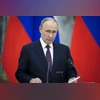Despite facing an onslaught of sanctions from Western powers amid the ongoing war in Ukraine, the Russian economy is faring unexpectedly well. In its recent report, the World Bank upgraded Russia from an ‘upper-middle-income’ country to a ‘high-income’ one, a status it last held in 2014.
The report credited several factors – including trade growth (6.8 per cent), an increase in construction activity (6.6 per cent), and a booming financial sector (8.7 per cent) – for the increase in the real gross domestic product (GDP) (3.6 per cent) of the nation. These figures are particularly surprising given that Russia recorded a contraction in its growth in 2022, the year when it commenced its offensive against neighbouring Ukraine.
In fact, Russia is likely to continue witnessing economic growth up to 2029, according to an International Monetary Fund (IMF) projection. But are wars not catastrophic for economies?
Analysing the anomaly
Typically, a war is damaging to an economy due to the stress it puts on resources and the loss of human capital. However, the ‘war economy’ phenomenon seems to have contributed to Russia’s growth, according to the World Bank. “Economic activity was influenced by a large-scale increase in military activity in 2023 and a rebound in trade.”
Additionally, the sanctions have failed to slow down the Russian economy. On the contrary, Western brands like McDonald’s have been replaced by Russian ones like ‘Tasty that’s it’. Furthermore, Russia’s exports, such as oil, have not suffered due to heavy purchases from countries like India and China.
Analysts also point out that Russian President Vladimir Putin had been insulating the country against Western sanctions even before invading Ukraine through measures such as import substitution, strengthening partnerships with Asian economies, reducing dependence on the US dollar, and even counter-sanctions.
More From This Section
However, experts add that the picture is hardly rosy for Russia. They suggest that Russia could be reduced to a ‘petro-state’ that survives only by selling its natural resources to China. There would be little incentive for Putin to move towards sustainable development, ultimately hurting ordinary Russians.
Ukraine, also an outlier
Not just Russia, Ukraine has also moved up the ladder. Previously a lower-income nation, Ukraine is now an upper-middle-income country, according to the World Bank report.
While the country’s economy suffered a massive 28.8 per cent decline in its GDP growth when the invasion began, it is now growing at 5.8 per cent. A significant increase in investment spending as part of reconstruction efforts is fuelling the war-torn nation’s economy, said the World Bank.

)